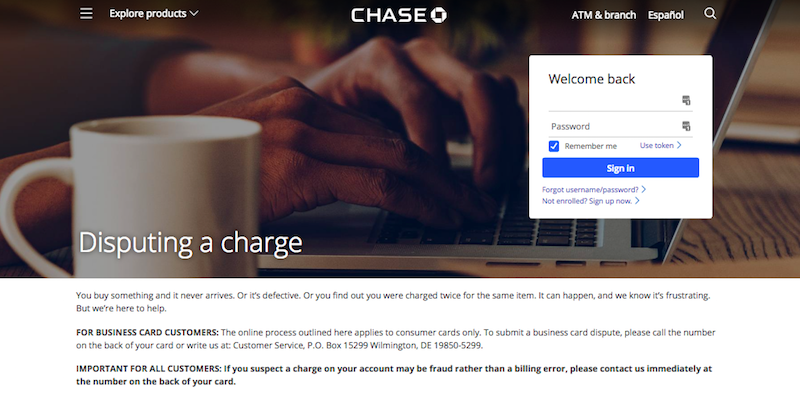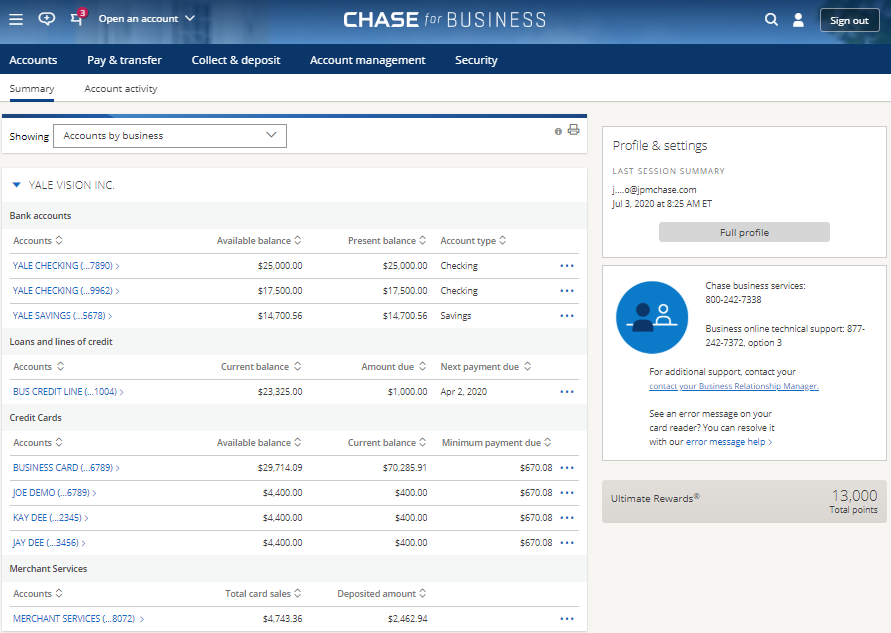
Chase credit card dispute code#
You’ll notice each category is denoted by a two-digit number, while the specific reason code is a subset of the that group represented by a decimal place. Visa Chargeback Reason Codes: With the introduction of Visa Claims Resolution, Visa overhauled their entire reason code system, introducing a new list grouped into four categories: processing errors, authorization errors, fraud, and customer disputes.

We've provided a breakdown here of the four major US-based schemes to help demonstrate the similarities and differences between the reason codes of different card networks: However, the four most widely-used in North America and Europe are Visa, Mastercard, American Express, and Discover. Some are specific to certain regions or nations, while others are focused on specific industries like travel and entertainment cards, and each card scheme has their own system of chargeback reason codes. There are numerous different card brands throughout the world. Whatever the reason code designation being used, the lists all serve the same basic purpose: to identify and describe the underlying motivation behind the transaction dispute. Having multiple lists can be confusing, but the chargeback justifications behind them remain pretty consistent across all networks.


Payment service providers like Paypal may also have unique codes, too. You, the merchant, can either accept the dispute, or use the reason code to build a case with compelling evidence why the original transaction was valid.Įach of the major card networks-American Express, Discover, MasterCard, and Visa-has its own specific set of codes. The bank files a chargeback and attaches a chargeback reason code to the case, which is a 2-to-4-digit alphanumeric code meant to identify the reason for the dispute. Let’s assume that a cardholder, or the issuing bank acting on the cardholder’s behalf, decides to dispute a transaction. Reason codes are important to help merchants address recurring chargeback triggers, as well as identify frivolous chargebacks, against which the merchant will need to fight back. Each of the major card brands, including Visa, Mastercard, and others, have their own system of reason codes. What is a Reason Code?Ī chargeback reason code is a 2-to-4-digit alphanumeric code provided by the issuing bank involved in a chargeback, which is meant to identify the reason for the dispute. Need more information? Keep reading to get the reason code rundown. Need to look-up a chargeback reason code? Use the widget above simply key-in your reason code and get a detailed explanation of what it means. We've provided a breakdown here of the four major US-based schemes to help demonstrate the similarities and differences between the chargeback codes of different card networks. However, the process can still cause a lot of confusion, especially at the merchant level, where there’s no insight into the process of assigning a reason code. In theory, the bank representative can review the list of reason codes, and either select the most appropriate code for the case at hand or reject the claim if none of the approved reasons apply. Chargeback reason codes were created to standardize the list of acceptable reasons why a bank may file a credit card chargeback or debit chargeback on their customer’s behalf.

The existence of a fiduciary duty does not prevent the rise of potential conflicts of interest.Chargeback Reason Codes: The Ultimate GuideĮvery chargeback has something which triggers the initial dispute. There are no guarantees that working with an adviser will yield positive returns. Working with an adviser may come with potential downsides such as payment of fees (which will reduce returns). All investing involves risk, including loss of principal. This is not an offer to buy or sell any security or interest. We do not manage client funds or hold custody of assets, we help users connect with relevant financial advisors. SmartAsset does not review the ongoing performance of any RIA/IAR, participate in the management of any user’s account by an RIA/IAR or provide advice regarding specific investments. SmartAsset’s services are limited to referring users to third party registered investment advisers and/or investment adviser representatives (“RIA/IARs”) that have elected to participate in our matching platform based on information gathered from users through our online questionnaire. Securities and Exchange Commission as an investment adviser. SmartAsset Advisors, LLC ("SmartAsset"), a wholly owned subsidiary of Financial Insight Technology, is registered with the U.S.


 0 kommentar(er)
0 kommentar(er)
